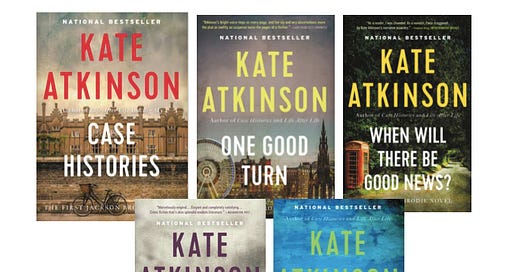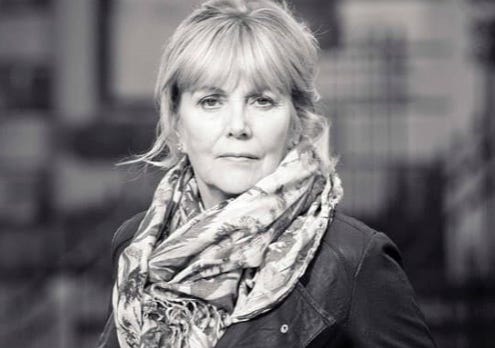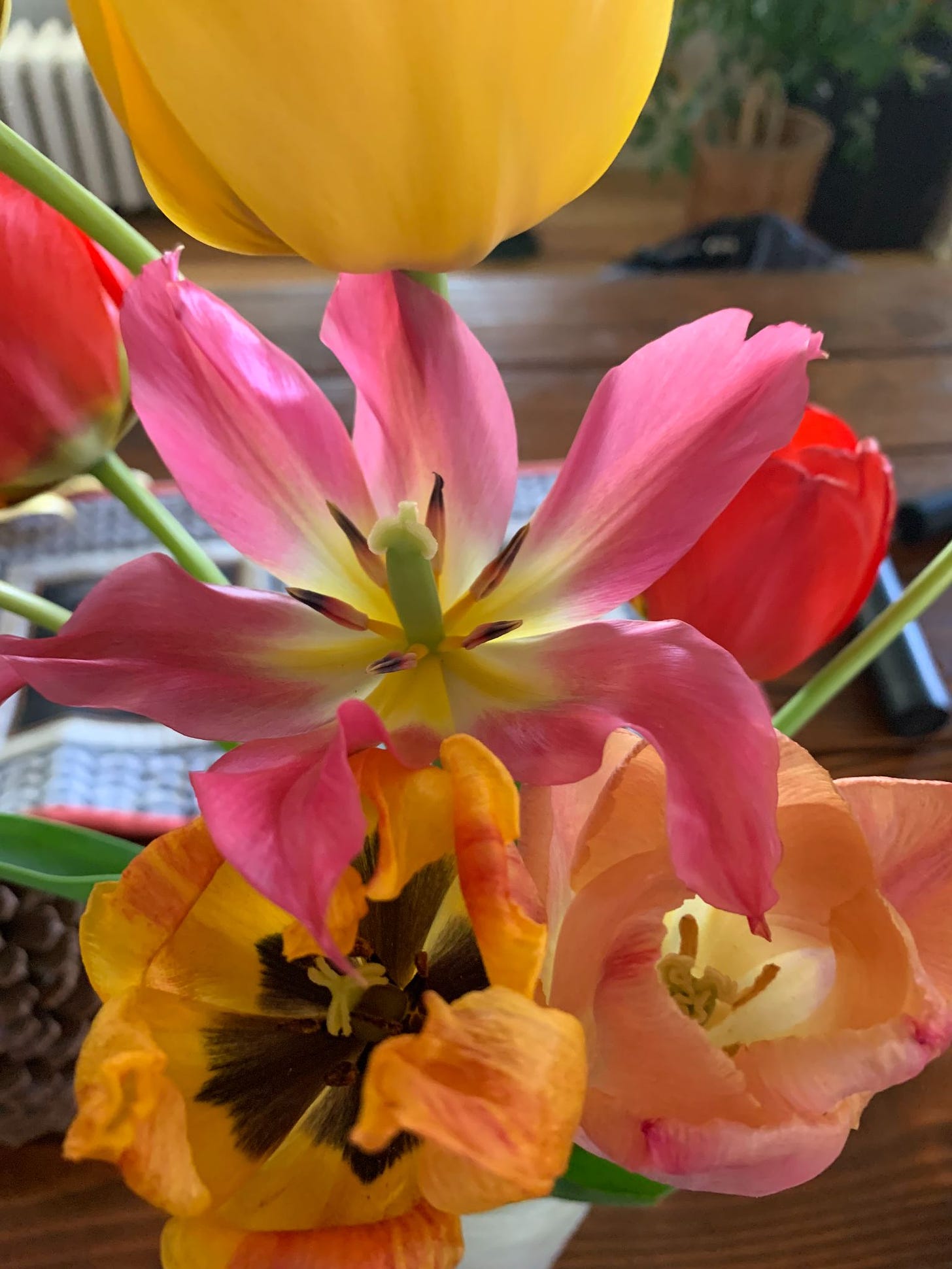Before we begin
When do you read? Where do you read? Is it something you do privately, in public, whenever you can, only at certain times of the day? When is reading a pleasure and when does it feel like something you “must” do?
Welcome! You’ve reached Spark. Learn more here or just read on. If you received this from a friend, please join us by subscribing. It’s free! All you have to do is press the button below. If you have already subscribed, welcome back! BTW, If this email looks truncated in your inbox, just click through now so you can read it all in one go.
A Brodie binge
I come to you bleary-eyed and satisfied. I just finished Big Sky, the fifth novel in Kate Atkinson’s Jackson Brodie series. I read each of the five obsessively and in order, as recommended by Sparker and poet Andrew Merton a few months back in the comments section. Actually, he said nothing about being obsessive. But obsessed I was.
I read the books after writing, during lunch, during commercials in front of the television, in bed at night, yes, on the toilet and, and once in the bath which resulted in a watermark or two. Hopefully, the librarians won’t notice. I read them while finishing Braiding Sweetgrass which we talked about last week. I admit, that felt vaguely wrong, almost sacrilegious. The Brodie books blew me even further off the course I’d set for myself when I assembled my aspirational TBR list for 2023.
I have no regrets.
Atkinson is, hands down, one of the most intelligent, fearless, interesting, skillful, and entertaining writers in the world today, a conclusion I came to after reading Life After Life, soon followed by Behind the Scenes at the Museum (her first novel), A God in Ruins, and Transcription. I look forward to reading her two earlier novels, Human Croquet and Emotionally Weird as well as her latest, Shrines of Gaiety because at this point, I just want to read everything she’s ever written to see what she’s trying to do and if she brings it off.
In the Brodie novels, she acknowledges many of the familiar murder mystery/private eye tropes and uses them as clay for much richer stories that are, by turns, funny, suspenseful, sad, and always leave unanswered questions – if not about the crime – then about what it means to be good woman or a good man, about humans confronting mortality, grief, love, or all the ways to live a life in a world that is uncertain and, often, cruel. Also, there are dogs.
“Novels gave you a completely false idea about life, they told lies and they implied there were endings when in reality there were no endings, everything just went on and on and on.” ― Kate Atkinson, Case Histories
As I write these words, I am aware that you may already know all this and much more about Kate Atkinson and Jackson Brodie, the ex-cop turned investigator finding his way through middle age, divorce, and parenthood, while hauling the weight of a childhood marked by loss and hardship. I am, I know, late to the Jackson Brodie series. I am aware of the British television program based on the Brodie novels although I’ve never watched it. I wanted to read the books first but I was also reluctant to start them – I was half-afraid they would be such a departure from her other novels that I would be disappointed.
I needn’t have worried.
Case Histories introduces Brodie along with the women whose voices will remain in his head long after they have left his bed. His daughter is his living light and his car is his church. He loves country music and the ghost of his sister who was murdered when Jackson was 12 and his brother who blamed himself for his sister’s death and committed suicide. He is the product of the Army which he joined at sixteen, and the police, another institutional haven that both constrained and supported him over the years. He craves family yet remains unaware of how he might have contributed to the dissolution of his marriage. In fact, most of the characters in this book – and there are many in each of these books – lack a certain self-awareness. We see them getting on with things, blocking certain things out, repeating certain patterns, stumbling their way forward the way people tend to do.
“Mum had worshiped Princess Di and frequently lamented her passing. “Gone,” she would say, shaking her head in disbelief. “Just like that. All that exercise for nothing.” - Kate Atkinson, When Will There Be Good News?
The book presents three different deaths which are not connected by a single killer but by Brodie himself as he focuses on finding three different girls who went missing years before. The connecting threads, the common themes, are rooted in the burdens carried by those left behind and the desire for answers which don’t always exist even when the mysteries are solved.
“Novels gave you a completely false idea about life, they told lies and they implied there were endings when in reality there were no endings, everything just went on and on and on.” -― Kate Atkinson, Case Histories
We see many of the same patterns in the subsequent novels: lots of characters, multiple crimes and cases, and connections both missed and made as Jackson ages and confronts his mortality, his limitations, and what matters to him. He is always a connecting character but, strangely, not always the central character in the book. By the time we get to Big Sky, he is more of a witness than driver of the plot - not something you see every day in typical crime fiction. And this brings me to one of the biggest reasons I loved these books: the women.
“Gloria regretted that she wasn’t a knitter, she could be producing a useful garment while waiting for Graham to die.” ― Kate Atkinson, One Good Turn
In each novel, there are flawed, funny, damaged, morally conflicted, powerful female characters without whom the books would collapse. In Case Histories, there is the ambivalent mother convicted of murdering her husband with an ax. In One Good Turn, there is Louise, a scarred Scottish police officer and single mother ambushed by love of her only child on the one hand and, on the other, Gloria, the steely conventional wife of a money-launderer with more guile and heart than anyone knew. We meet Reggie, a fiercely intelligent and persistent young orphan of sixteen in When Will There Be Good News who saves Brodie’s life and then makes him save the life of the person who took her in after her mother drowned. Tracy, a retired ex-cop “with a shell so thick there was hardly any room left inside,” rescues a small girl by buying her from the prostitute who is dragging her across the mall. These women, like Brodie and some of the other male characters, must decide what justice really means to them and be willing to face the consequences of doing the morally questionable thing for the right reasons.
“This was love. It didn't come free, you paid in pain. Your own. But then nobody ever said love was easy. Well, they did, but they were idiots.” - Kate Atkinson, Started Early, Took My Dog
How Atkinson tells the story is as thrilling for me as the plot and the characters. In Atkinson’s hands, time is fluid – she moves back and forth through time, starting with an event that takes place years earlier and returning to it throughout the book. The books are not riddled with dialog-intensive scenes that unfold in a cinematic way. Instead, we are privy to each character’s thoughts, their internal dialog with themselves and others as they navigate problems. She does this with such skill that I found myself thinking of John LeCarre and Anne Tyler – two very different novelists but each a master at revealing characters through their thoughts and actions even when these same characters remain rather clueless to their own motivations.
“Running wasn’t pointless, of course. Sometimes you did it to try to outrun your thoughts, sometimes you did it to chase them and bring them down. Sometimes you did it so that you didn’t think at all.” ― Kate Atkinson, Big Sky
The more I try to capture what I loved about reading the Jackson Brodie books, the more I realize that her craft, her skill, her characters were not the point. They are givens. What was not a given to me was that feeling I had when I started and wanted to keep going, to squeeze in one more page, one more chapter, to find the next book as soon as I could, the way I did when I was a kid hiding in the back of algebra class, text open on my desk, Gone With the Wind open in my lap. It felt decadent, yet necessary.
These books did not directly feed my writing (although they did get my brain working in different directions). They did not fit into my reading plan for the year. They caused me to take shorter walks with my dogs. They interfered more than once when my husband tried to engage me in conversation over breakfast. There was only one reason to gobble them up the way I did: pure pleasure.Perhaps that is reason enough.
What was the last book that made you want to drop everything else to read it?
More about Kate Atkinson
In this concise and fun interview with The Guardian, Atkinson whose literary chops have won her the Whitbread not once but three times, explains that she “lives to entertain” and leaves the categorization of her books to others.
In this longer interview with Susan Orleans, Kate Atkinson talks about all her books and how she approaches writing. I had forgotten that she hadn’t published until she turned 43. She talks about how she plays with time and structure, her fascination with character, and her unapologetic appreciation for the fusion of character and plot to tell a good story. Some takeaways include:
“The longer I think about a book, the quicker it is to write.”
“I think it is a really fascinating thing to create a character…it’s really quite an old-fashioned thing to cleave to your characters so much but I think, you know, that character and plot form a pretty sound basis for novels.”
After years of writing as long as she could each day, she now sets a goal of a thousand words a day. “That’s probably so simple and everybody’s done it but I’ve never actually done that before.”
She was her own mentor and practiced by writing stories for women’s magazines while working at many different sorts of jobs from cleaning to office work, a fact that led some to say that a “chambermaid” had won the Whitbread for Behind the Scenes at the Museum.
And remember,If you like what you see or it resonates with you, please share Spark with a friend and take a minute to click the heart ❤️ below - it helps more folks to find us!
How one reader gets the reading done
I often get the question that Jeremy Anderberg answers in this post: when do you read so many books? My answer is a mystery even to myself although my behavior with the Jackson Brodie books provides a little insight. Jeremy Anderberg makes the time on his calendar and begins every day with at least 45 minutes of reading. I kind of loved that. Click below to find out what else he does.
The writers (and editors) among us: an idea

I’ve been noodling on this for a while and want to know what you think. I’d like to create a space on Spark for those authors in our community to share their books so those of us looking for our next read can check them out. I’d also like to create a space for those Spark folks who help writers with craft and the business of writing – editors, writing consultants, readers, etc. – so those who need their help can find them more easily. How does this sound to you? If you like the idea, I’ll put a form together for next week so that we can gather names and info in a way that is easy to access and update. These spaces would be for authors and professionals who subscribe to Spark. You can use the survey below to let me know or just let me know in the comments or by replying to this email. Thank you!
For writers and readers
In the coming weeks I will be updating our Resources for Readers and Writers. Take a look at what is there now and if you know of any person, book, group, website, classes, or anything else that can help your fellow readers and writers, please send me the info so I can include it.
A Mighty Blaze seeks support
The brainchild of authors Caroline Leavitt and Jenna Blum has helped authors to reach thousands of readers since it was launched out of necessity during the pandemic. It’s a great source of info about new books, interviews with authors, and other book-related stuff. Check it out if you are not already familiar with it and consider supporting their work which, from what I can tell, has been largely funded by the founders themselves. To learn more, click here.
Spark is yours: chime in
Have you just finished a book you loved? Tell us about it. Got a great resource for readers or writers? Share away! How about sharing your book stack with us, that tower of tomes rising next to your bed or your bath or wherever you keep the books you intend to read – someday. And if you stumbled on a Moment of Zen, show us what moved you, made you laugh, or just created a sliver of light in an otherwise murky world.
Thank you and welcome
Thank you to everyone who shared Spark with a friend again this week. Welcome to all new subscribers! Thank you so much for being here. If you would like to check out past issues, here’s a quick link to the archives. Be sure to check out our Resources for Readers and Writers too.
That’s it for this week. Let me know how you are and what you’re thinking about. And of course, always let me know what you’re reading. If there’s an idea, book, or question you’d like to see in an upcoming issue of Spark, let us know!
Ciao for now.
Gratefully yours,
Betsy
P.S. And now, your moment of Zen…explosion of color
Subscriber Mary Fruchter, publisher of Mary’s Pocketful of Prose, offered this moment of Zen this week. The colors remind me of a sunset – the last blaze of glory before the day burns out.
Calling for Your Contribution to “Moment of Zen”
What is YOUR moment of Zen? Send me your photos, a video, a drawing, a song, a poem, or anything with a visual that moved you, thrilled you, calmed you. Or just cracked you up. This feature is wide open for your own personal interpretation.
Come on, go through your photos, your memories or just keep your eyes and ears to the ground and then share. Send your photos/links, etc. to me by replying to this email or simply by sending to: elizabethmarro@substack.com. The main guidelines are probably already obvious: don’t hurt anyone -- don’t send anything that violates the privacy of someone you love or even someone you hate, don’t send anything divisive, or aimed at disparaging others. Our Zen moments are to help us connect, to bond, to learn, to wonder, to share -- to escape the world for a little bit and return refreshed.
I can’t wait to see what you send!
And remember,If you like what you see or it resonates with you, please share Spark with a friend and take a minute to click the heart ❤️ below - it helps more folks to find us!








I am an avid reader,especially of fiction and poetry which I also write. This makes up about seventy percent of my life; the rest is spent with my family and friends.
I have no particular time that i read although I often read poetry late at night and early in the morning. Lately Im finding the spectacular poetry of Hyesoon Kim, Vi Khi N Dao, Mahmoud Darwish, and Douglas Kearney so I tend to drop everything and keep reading. Im retired and not starving so Im fortunate enough to do that.
Im never bleary eyed and Im usually satisfied and more often than not thrilled and delighted that so many human beings are so amazing in how they use language- Virginia Woolf, Jean Toomer, James Alan Mcpherson, Grace Paley, Toni Cade Bambara, Vasko Popa, Hassan Blasim, Darwish, Pablo Neruda, Nicholas Guillen, Ernest Hebert, Chinua Achebe, Tadeusz Rozewicz, Bao Nin, Doan Le, Frances Chung, and so many others.
When I find a writer I llike I wind up reading everything by them. Im 77. Ive read at least ten books by Chester Himes, Richard Wright, Graham Green, Edna Obriene, Sherman Alexie, Cynthia Ozick,
Haruki Murakami, William Faulkner, Patricia Highsmth, Mahmoud Darwish, to name a few
Loved your insightful take on the work of Kate Atkinson, one of my favourite authors. I think I’ve read every book she’s published with the exception of a collection of her short fiction, which I must get to. My co-host and I recently talked at length on our podcast “Two Chairs Talking” about her novel Life After Life and the BBC television series based on it.